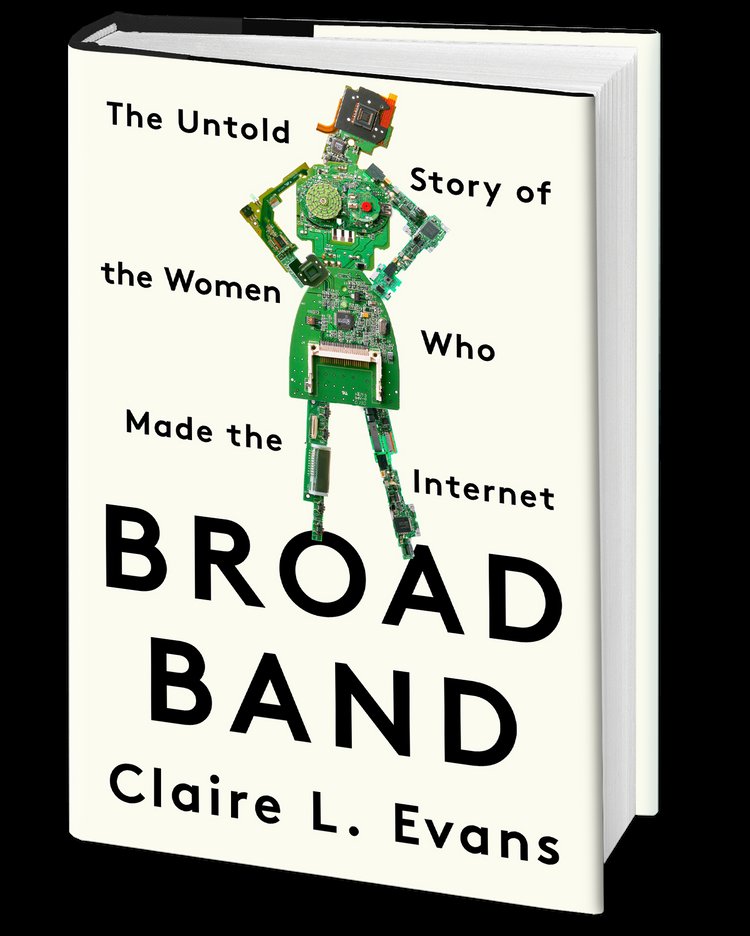One of the most Monkey's Paw things about my life is my relationship to books. When I was a teenager, I read all the way through the school and public libraries, spent everything I had on books, and still couldn't get enough and dreamt of more.
1/
1/
Today, as a reviewer, I have more books than I can possibly read, huge, teetering mountains of books that I'm desperate to read, far beyond my ability to ever get through them. Periodically, I declare "book bankruptcy," sweep away the backlog and start over.
2/
2/
Even then, my eyes are bigger than my stomach: I keep back a few books that I can't bear to part with and promise myself I'll read them someday. Usually I don't, but I just did, and boy did I ever make the right call with @TheUniverse's BROAD BAND.
https://clairelevans.com/
3/
https://clairelevans.com/
3/
I have read a LOT of histories of computing, and I had a front row seat for a lot of the events depicted in this book - people I worked with, people I worked against - and yet I was surprised over and over again with details and perspectives I'd never encountered.
4/
4/
For example, for some reason, my ninth grade computer science course included lengthy readings on ENIAC, Univac, the Mark I and the Mark II, but none of those mentioned that they were all programmed exclusively or primarily by women.
5/
5/
And Evans doesn't just explain this fact, but - because she is a brilliant and lyrical writer - she brings these women to life, turns them into fully formed characters, makes you see and feel their life stories, frustrations and triumphs.
6/
6/
Even the most celebrated women of tech history - Ada Lovelace, Grace Hopper - leap off the page as people, not merely historical personages or pioneers. Again, these are stories I thought I knew, and realized I didn't.
7/
7/
Some of this can be chalked up to the haze of history - I don't know much about the lives of Lovelace's contemporaries regardless of gender or class - but the main culprit here is erasure, obviously.
8/
8/
These women were written out of the record from the beginning, and the process only accelerated over time. The professionalization of programming - the coining of "software engineer" - coded a female trade as a male profession and precipitated a mass exodus of women.
9/
9/
But despite this, women continued as tech pioneers, excelling in the marginalized, disfavored parts of the field: UX, community, "girl games," hypertext, multimedia and so on.
10/
10/
The specialities that men turned up their noses at, until women proved out their significance (and/or profitability) whereupon men rushed in to dominate them, shouldering women aside.
11/
11/
Reading this outstanding, important book, I found my views on erasure and exclusion evolving, first being brought into focus by Evans's skilful weaving of biographies, interviews and historical source documents, which made the abstract idea of erasure concrete.
12/
12/
From there, Evans demonstrated how marginalized people move into marginalized subfields, defying odds and overcoming hurdles that their mainstream - white, male, affluent - contemporaries don't face, and then elevate these subfields to centrality.
13/
13/
This dynamic is present in many fields of endeavor - think of how Black music (blues, jazz, rock, hiphop) went from the margins to the center when it was co-opted by white musicians who often did a worse job for more money and fame.
14/
14/
It's another example of what @scalzi calls "living life on the lowest difficulty setting," and it's the basis for affirmative action.
https://whatever.scalzi.com/2012/05/15/straight-white-male-the-lowest-difficulty-setting-there-is/
15/
https://whatever.scalzi.com/2012/05/15/straight-white-male-the-lowest-difficulty-setting-there-is/
15/
Consider two candidates: one who attains the top of their field after being trained and supported by the best of the best, and the other who trails them by a step or two - but never had their advantages. Which one has the most potential?
16/
16/
Broad Band isn't just a tale of the women whose stories were erased - it's also the implied story of all the people (not just women) whose stories never got to happen.
17/
17/
Telling the erased stories of people who excelled against all odds through luck and brilliance exposes a void: the people who didn't have that luck, that brilliant, who never got to make a contribution.
18/
18/
After all, the women pioneers in computing trend whiter and wealthier than the median person in America. The notable exceptions - like the Black women who made the space program possible - demonstrate this disparity arises from exclusion, not a lack of aptitude or desire.
19/
19/
Broad Band isn't merely a celebration of the hidden heroes of the computing revolution - it's also an epitaph for all the people whose talent, aptitude, dreams and contributions were squandered by a system based on mass exclusion.
20/
20/
What's more, it's a tale that shows that the differences between fields are socially - not biologically -determined. The women who break through to male-dominated roles as CEOs and VCs are just as prone to selling out workers and users as their male counterparts.
21/
21/
I'm so glad that I saved my copy of Broad Band from my repeated book bankruptcies since 2018, but I confess that I didn't read that print copy - rather, I listened to the audiobook, which Evans herself reads.
22/
22/
Evans isn't just a superb writer, interviewer and researcher - she's also a brilliant voice actor, whose reading is gripping, exuberant, sorrowful and enraging by turns. I love hearing a book read by its author...when the author is a good reader. Evans is the whole package.
eof/
eof/
ETA: if you'd like to read or share this review as a blog post, here's a copy on my site http://pluralistic.net , which has no trackers, ads or surveillance.
https://pluralistic.net/2021/02/13/data-protection-without-monopoly/#broad-band
https://pluralistic.net/2021/02/13/data-protection-without-monopoly/#broad-band

 Read on Twitter
Read on Twitter


